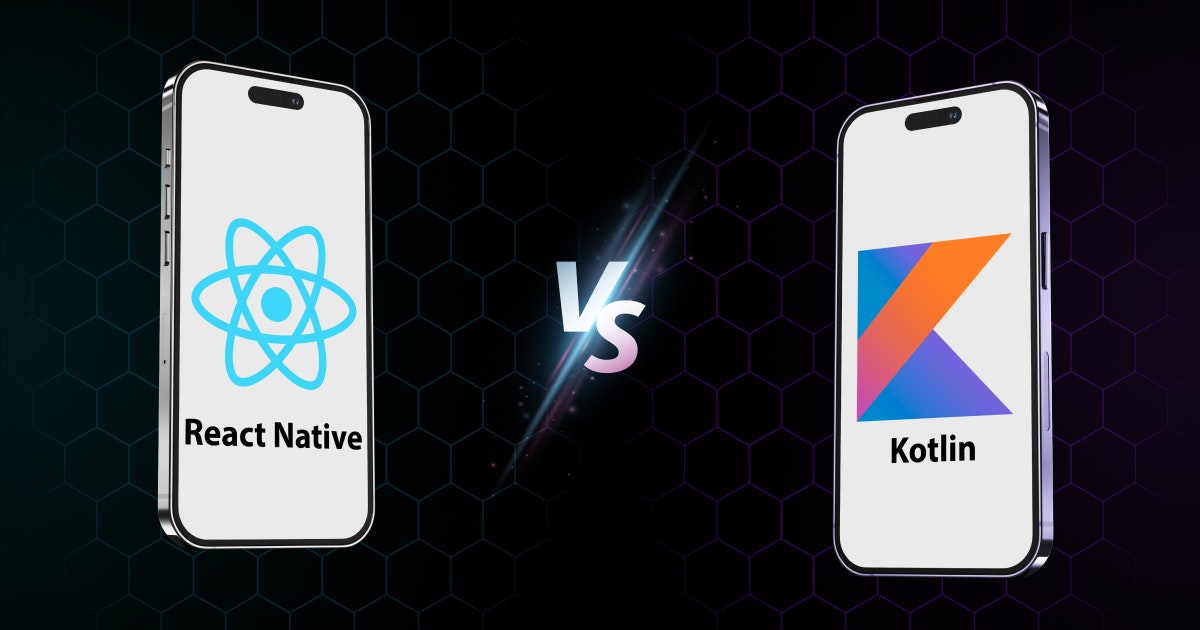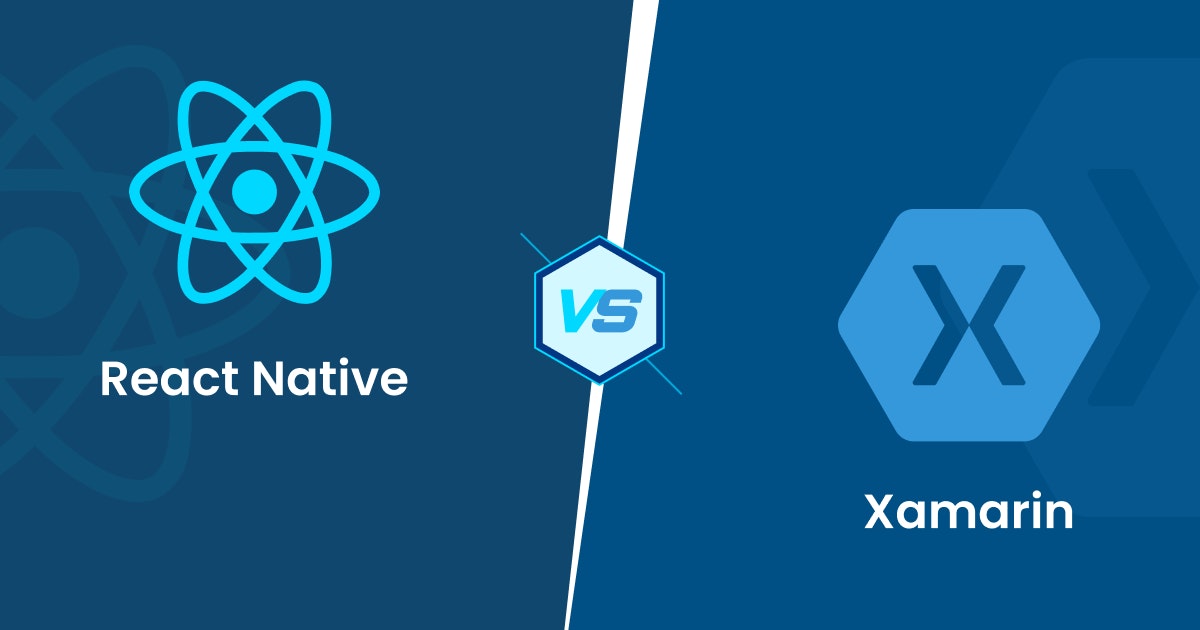Table of Content
The idea of multi-platform development revolves around a software application that works well in more than one digital habitat. The capability is typically pursued for selling software for more than one operating proprietary system, such as the use on both Microsoft and Apple platforms.
There is a reason why cross-platform development has gained popularity. It allows developers to work on a single codebase, which has the capability of running on different platforms. This removes repetitive tasks from the development cycle and speeds up the overall process.
Therefore, multi-platform development is cost-effective and helps the application reach audiences across all platforms. A few fundamental strategies for multi-platform development include compiling different versions of the same program for different operating systems.
The concept makes the problem abstract at certain levels to accommodate different software environments. You can say such software is “platform agnostic.” Developers can use application programming interfaces (APIs) to adjust a piece of software to a specific platform.
There is a limitation that multi-platform development can make an application less efficient. For example, it can require redundant file storage folders or processes for supporting various systems. However, developers have understood that this is a minimal price to pay for all the benefits multi-platform development offers.
As the concept became popular, several multi-platform app development tools and frameworks started to mushroom in the market. The result? Now, developers have many options that they can use for multi-platform development.
Sure, it can get overwhelming if you do not know which option to choose. But we have done our homework and identified two multi-platform development frameworks - React Native and Kotlin - that you must know about. Let us study them both in detail:
React Native
What is React Native?
React Native is a JavaScript-based framework used mainly for building native-like Android and iOS applications. It has quickly become the favorite choice for multi-platform app development in the past few years. React Native’s codebase is used for web apps and desktops.
Features of React Native
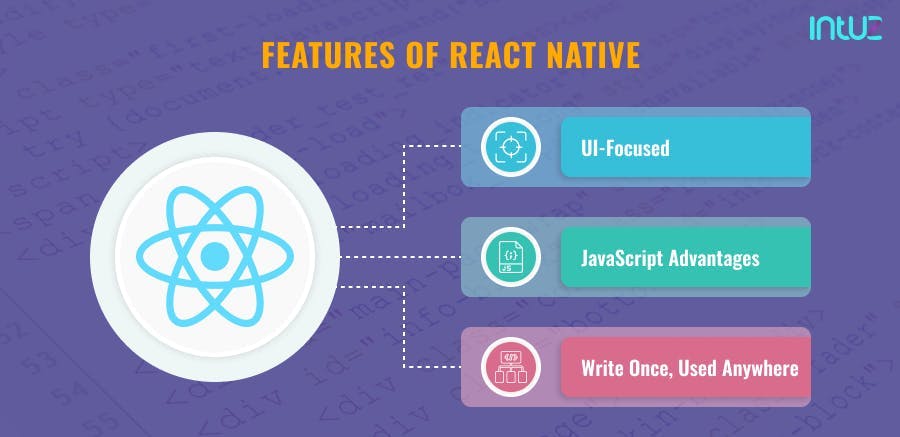
Features of React Native
There is a reason why many multi-platform app developers prefer using React Native - it is easy to use and highly scalable. Here are the top features.
- UI-focused: React Native gives much emphasis to designing the app UI. It is highly responsive and delivers excellent rendering capabilities.
- JavaScript advantages: You can always easily find developers to work on React Native because of its association with JavaScript. This further broadens the talent pool when you are looking for a helping hand to build a React Native app.
- Write once, used anywhere: React Native allows you to write the codebase only once, and you can use the same native code for all platforms - be it Windows, Android, or iOS. That is why it is such a brilliant option for multi-platform app development.
Pros and Cons of React Native
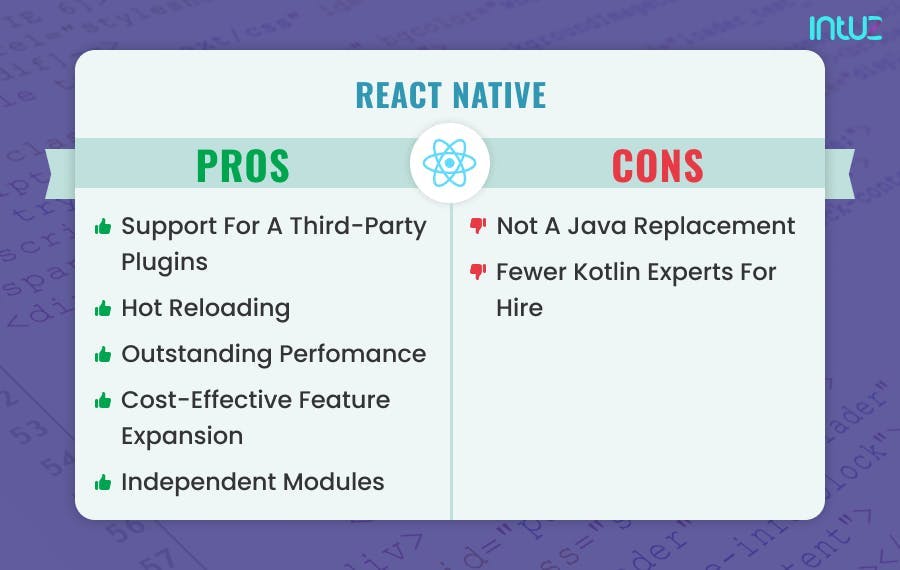
Pros and Cons of React Native
Pros of React Native
The framework is open-source, free, and community-driven. If you ever hit a snag during development and need help, you can reach out to anyone across the globe and move forward with your project. However, that is not it. There are other advantages of React Native as well:
1. Support for third-party plugins
React Native supports the use of external plugins for JavaScript and native modules. That is due to the unavailability of some components in the framework. React Native empowers you to connect the plugin with a third-party module.
2. Hot reloading
React Native developers can quickly view changes made to the application codebase in the preview window. That means whatever modifications they make to the app can be reviewed in real-time. This fastens the feedback process, and the development can be finished faster.
3. Outstanding performance
React Native makes use of modules and native controls for building apps that deliver excellent performance. It connects to an operating system’s native components and writes a codebase through native APIs. React Native can build threads different from native APIs and UIs.
4. Cost-effective feature expansion
Adding new features to an existing web application is a straightforward process. You need to inject UI components into an existing application without rewriting the entire app from scratch. This feature helps extend the app’s features and is called “Over The Air” or OTA updates.
5. Independent modules
React Native has a modular architecture that separates the program functions because of free blocks known as modules. They enhance the updation process and versatility of the app, which means React Native can enable app updates on the go.
Cons of React Native
There are two sides to every framework. Naturally, React Native has its disadvantages:
1. Native language comprehension
Developers must know native coding to create an app in React Native. Without first-hand knowledge, you will find it tough to get anything done.
2. Licensing and patent issues
React Native has previously run into hot waters due to licensing and patents. It uses BSD-styled licensing along with the Grant of Patent by Facebook. That means the tech giant can terminate your right to use any open-source React Native projects if you contest Facebook’s Patent right. That compels you to work in a very restrictive environment.
3. Commitment issues
React Native is a risky framework because it must be consistently maintained to remain valid for application development. It is not a turnkey solution, and you may have trouble looking for long-term support for React Native.
4. Framework not mature enough
React Native has miles to go to resolve bug issues and uplift the overall application appearance. It is not mature enough. However, that does not support React Native as the go-to choice for app development.
5. Loosely-typed language
React Native does not impose specific variables and parameters in functions even though it uses JavaScript. And because a variable could comprise anything that poses a security risk to the entire development project.
Use cases of React Native
React Native is used for creating apps requiring heavy lifting. It is not suitable for resource-intensive apps. React Native was designed by Facebook to replace HTML5 to deliver exceptional mobile application experiences. Since then become a pro at silently working in the background of client devices and making JavaScript a feasible language for developers.
Real-life examples of React Native
Walmart, Bloomberg, Gyroscope, UberEats, Instagram, and Facebook Ads Manager are some famous brands using the framework for their React Native app development ventures.
Kotlin
What is Kotlin?
Kotlin was traditionally known as a programming language. However, in 2020, JetBrains rolled out free and open-source Kotlin Multiplatform, which specifically allows developers to use a single codebase for building apps for Android and iOS.
Kotlin is a statically-typed framework that generates a codebase that can run on the Java virtual machine. Its name originates from Kotlin Island, near St. Petersburg, Russia. Even though the language's syntax is not compatible with Java, Kotlin can interoperate with it.
Features of Kotlin
Kotlin is considered a practical option for multi-platform app platforms. Android has a proper setup for translating Java codes into Kotlin. Kotlin codebases can work on the Java Virtual Machine. Here are the top feature.
- Null point exception elimination: Kotlin aims to remove the blunderous Android SDK. The application crashes when developers use incorrect spelling in the codebase or forget the assignment.
- Runtime overhead minimization: The focused extensions from the Java library are included in Kotlin. The majority of tasks are in sequence, which minimizes the runtime expenses significantly.
- Extension functions: Kotlin allows developers to include methods to classes without changing the source code. You can adjust the pre-existing roles to the default classes and boost their functionalities.
Pros and Cons of Kotlin
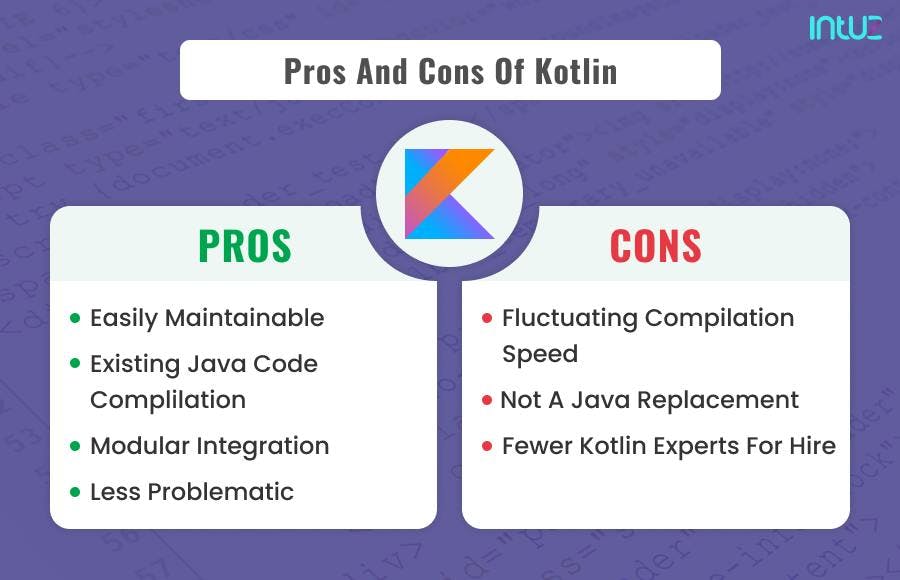
Pros and Cons of Kotlin
Pros of Kotlin
Kotlin is a compact programming language that invariably increases the efficiency of the application it is used on. More work can be done in less time with fewer lines of code. But there are several other advantages of Kotlin, which are:
1. Easily maintainable
Kotlin is supported by many IDEs, including Android Studio and other SDK tools. This boosts developers’ productivity as they continue to work with the toolkit they are used to.
2. Existing Java code compilation
Kotlin is 100% interoperable with Java, a programming language. It is consistent with all its related tools and frameworks, making it possible for developers to switch to the platform. Java can be used if an application cannot be written in Kotlin.
3. Modular integration
An enormous distinction to note about Kotlin is that it is an SDK, not a framework. This means developers with existing applications can add a module to assess its viability without making a huge commitment.
4. Less problematic
Kotlin enables the creation of a solid codebase that makes the foundation of the application more reliable and steady. What is more - bugs and glitches get identified during the compile-time, so it is possible to fix the blunders before runtime.
React Native vs. Swift: The Best Choice For Cross-Platform App Development
Leran MoreCons of Kotlin
No framework or SDK is perfect, and neither is Kotlin. Please consider these limitations before you decide to pick it up for your multi-platform app development process:
1. Fluctuating compilation speed
In some cases, Kotlin is faster than Java, primarily when performing incremental builds, but it is slower when compiling full builds. Moreover, let us not forget that Java enables clean builds. This is a valid concern for developers.
2. Not a Java replacement
Yes, Kotlin and Java are similar. But they are two different programming languages. One cannot expect to shift from one to another - without taking the time to learn Kotlin. Therefore, if you want to change your approach, you will have to invest financially to train them.
3. Fewer Kotlin experts for hire
Kotlin is literally a new kid on the block. Although it was launched in 2018, Kotlin Multi Platform did not come into existence before 2020. Naturally, there is a shortage of skilled and experienced Kotlin developers. You will find more success finding Java developers.
Use cases of Kotlin
Kotlin is predominantly used for Android app development - with Google’s official support. It comes in handy in building many project management tools, eCommerce sites, and social media platforms.
Real-life examples of Kotlin
Pinterest, Trello, Corda, Airbnb, Basecamp, and Zomato are some popular brands using the framework for their Kotlin app development ventures.
React Native vs. Kotlin: A robust comparison
React Native already tops the chart of the best cross-platform development tools. On the other hand, the recent launch of Kotlin Multiplatform completely supports cross-platform development for Android and iOS and is equipped with many modern features.
But there is no surprise these two frameworks are dissimilar in many respects. Let us do a comparative analysis in detail:
1. Performance levels
React Native delivers a native-like experience by allowing developers to create apps using JavaScript and native modules. React Native is blazing fast and offers a native look n’ feel on both iOS and Android platforms.
On the other hand, Kotlin enables developers to smoothly write platform-specific codebases and share business logic written in the programming language. Kotlin-based applications are fast but not more than React Native apps.
2. Development experience
React Native empowers developers with features such as ready-to-use components, hot reloading, and native development capabilities. Experienced developers can easily leverage JavaScript besides native UI for developing Android and iOS apps using the same codebase.
On the other hand, Kotlin Multiplatform allows developers to reuse the multi-platform logic and write platform-specific codebase whenever necessary, making the development cycle faster and hassle-free. Who does not want that?
3. Cost and time
When developing apps for multiple platforms, you also do not want to overshoot the timescales or budget. React Native is ideal if there is a budget constraint. It is perfect for building MVPs and prototyping.
Just like React Native, Kotlin is free and helps build fast apps with fewer resources. It is apt if time is a constraint for you as it takes less time and fewer lines to write and deploy the working code on Kotlin.
4. Learning curve
Despite using JavaScript and powerful libraries, React Native has a steep learning curve. Developers adept at JavaScript will have no problem using React Native for multi-platform application development.
Due to the wide adoption and potential of React Native, finding developers with the required skill set is easy. On the other hand, Kotlin has a shallow learning curve because it is fully interoperable with Java, and many web developers find it easy to learn and use.
Mentioned below is a representation of the differences between React Native and Kotlin in a table format:
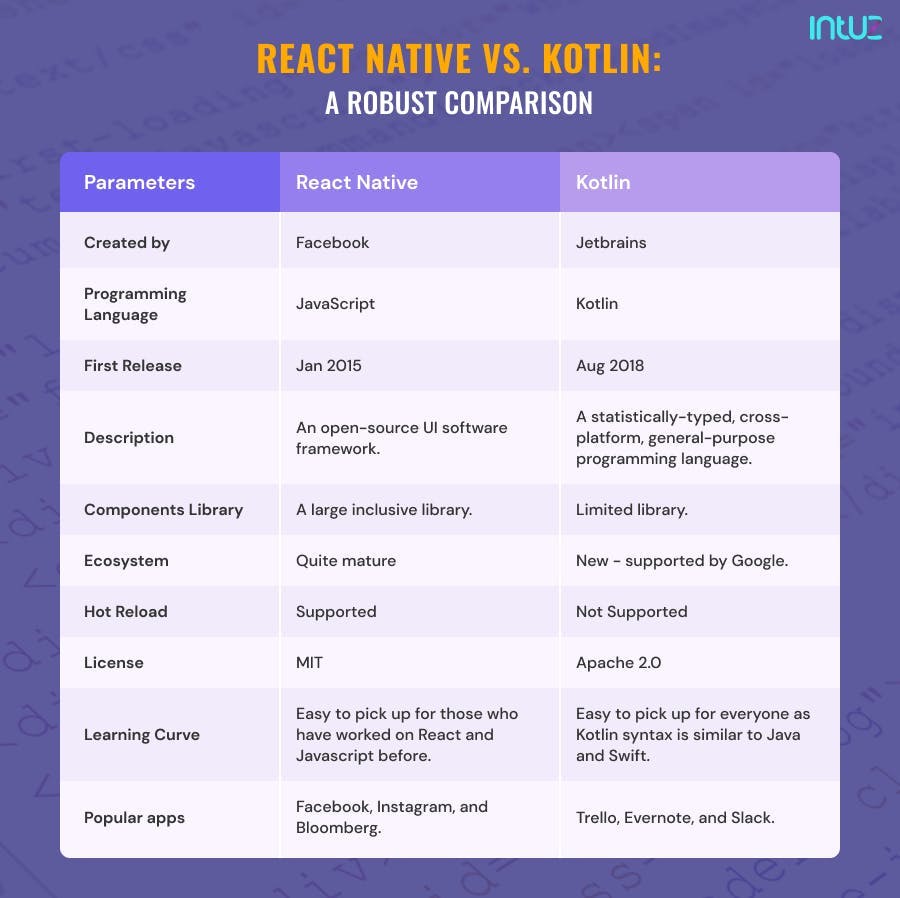
Differences between React Native and Kotlin
Over to you
Now that you have gone through both React Native and Swift, one thing is evident - both can successfully and efficiently aid multi-platform development. However, what you choose depends entirely on what you want to achieve with your project.
Whether you choose Kotlin or prefer to work with a React Native development company, picking the right option will help you turn around the software faster and cost-effectively. If you want to bounce ideas off someone, you can always count on us.
Intuz experts are pioneers in multi-platform development and have worked on multiple projects in the past decade. Drop us a quick note to get your queries resolved asap. Our knowledge and experience will amaze you. Speak soon!
